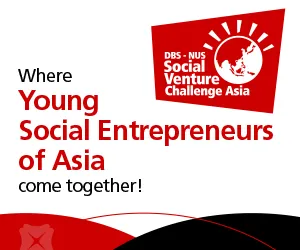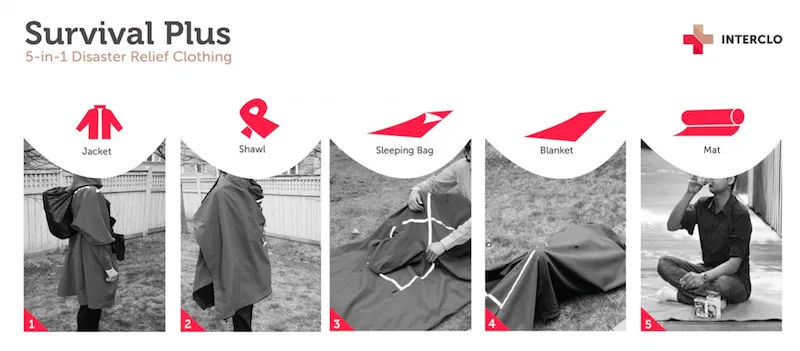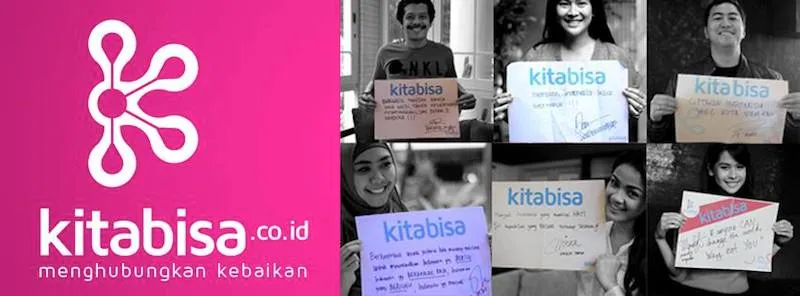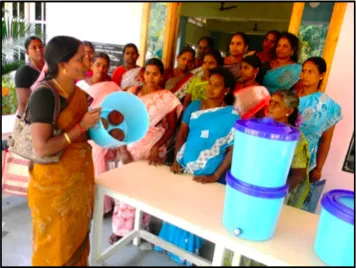Interclo Designs, Kitabisa and Water for All - DBS-NUS- Social Venture Challenge’s Semifinalists

This article is part of Young Entrepreneurs of the DBS-NUS Social Venture Challenge Series
DBS-NUS Social Venture Challenge Asia, a pan Asia competition for social enterprises aimed at identifying and supporting new social ventures that have the potential to generate scalable and sustainable social impact, announced its 12 shortlisted social ventures from over 400 applications received.
Three social ventures that made it to the semi-finals are Interclo Designs, Kitabisa and Water for All. Interclo Designs has developed a multi functional clothing aid for natural disaster survivors, Kitabisa is a crowdfunding platform for social ventures in Indonesia, and Water for All project has designed an efficient low cost water filter that works on micro-filtration and does not require any electricity to function.
Here’s more about these social ventures:
Interclo Designs
Nabeela Ahsan, Co-founder and apparel product developer at Interclo Designs, was volunteering in the aftermath of the Haiti earthquake of 2008 when she noticed that a lot of clothing that was being sent was winter wear and party wear. It was very hot in Haiti and the party clothes were just not practical. She decided to research on this further as part of her MA studies at Ryerson University, Toronto. Once she found out that there were no formal clothing-aid protocols in place, she set to work.
She founded Interclo Designs in December 2012. Interclo Designs is a social venture based out of Singapore that designs clothing aid to improve the clothing aid process for emergencies and disasters. Their first product, Survival Plus, is a unique, first-of-its-kind clothing-aid product that is multi-functional and can be delivered to survivors in the first wave of response.
“An average of 243 million people are affected in a decade by increasingly frequent and devastating natural disasters globally. Post disaster response protocol for clothing-aid is slow, inefficient and relies heavily on used and donated clothing that may not even be culturally or climatically suitable,” says Nabeela.
Survival Plus can be used as a shawl, a mat, a sleeping bag, a blanket and a poncho. It is constructed in a manner that makes it a suitable outerwear garment for both warm and cool weather and can be used universally by the injured, the elderly, the disabled and expectant mothers. It incorporates RFID features to ensure its safety from theft and for inventory control.

The core team at Interclo Designs comprises of Nabeela, Mateen Kirmani and Aimee Chiuten. Mateen lends his expertise in fund raising and relationship management to commercialize the products and services. Aimee designs marketing and customer outreach strategies, while enhancing the brand identity. Nabeela says,
DBS and NUS are prestigious institutions and we are privileged to be shortlisted as semifinalists in the social venture challenge. It gives us the traction we need, the bootcamp was very helpful and if we win, the award funds will be put to good use.
Kitabisa
Kitabisa is a crowd funding platform for social causes in Indonesia. “We at Kitabisa are trying to bridge the gap between social project idea owners, the change makers and resources owners by creating an opportunity for them to meet,” says M. Alfatih Timur, one of the Co-founders of Kitabisa.co.id. To secure their operational sustainability, Kitabisa charges 7% administration fees out of the total donation collected.
Kitabisa, literally meaning ‘We Can’, is attempting to be a home for credible and legitimate social projects. A project is assessed for its legitimacy before it becomes eligible to be listed on Kitabisa.co.id, a step to prevent users from supporting shady and dodgy projects or being scammed.
The idea was incepted in December 2012 and their website officially launched in July 2013. Over the last nine months of their operation, more than 100 projects have proposed, with 60 qualifying and out of which 18 have been successfully realized, gathering a total of 486 million rupiah. The projects have been in various categories such as environment preservation and protection, child education, community empowerment etc.

“With 70 million plus Internet user in Indonesia alone, we know the opportunity is huge. Crowd funding is an entry point, our ultimate goal is to be a collaboration platform. We will be introducing and improving another features of collaboration such as volunteering and knowledge sharing,” says M. Alfatih Timur.
Kitabisa hopes to inspire and empower Indonesians to collaborate and drive social change ‘from the people, for the people’.
Speaking about being shortlisted as a semifinalist at DBS-NUS Social Venture Challenge Asia, M. Alfatih Timur says,
Being shortlisted at the challenge brings confidence to us. Especially in this very initial stage of crowdfunding in Asia, we need more support and acknowledgement to scale up. The boot camp at the challenge not only provided us textual concept and theory but also real experience and networking with prominent social entrepreneurs.
Water for All
The project ‘Water for All’ was started in 2009 by J. Chandrasekaran. He travels a lot to villages documenting heritage sites, temples, mandaps etc. During such visits, he found two major problems plaguing the rural fabric of India – water and sanitation.
To solve these, he started with an objective of harnessing technology to make affordable solutions for providing clean drinking water and sanitation. Adopting technology given by Council of Scientific and Industrial Research – CSIR (IMMT) Bhubaneswar, he began his journey of making water filters, which need no electricity and work in the principle of micro filtration.
The filter developed by the Water for All project is suitable for customers in villages as this low cost filter does not need any resource for running after purchase. Chandrasekaran claims that it is the lowest cost effective water filter available in the market that provides clean water to customers in villages.

Watsan Envirotech, the parent company of Water for All project, has joined hands with IIT Madras for making arsenic filters. Till date, it has catered to approximately 40,000 users. It wants to automate the whole nano-clay filter manufacturing plant and spread it wings by establishing marketing centres across the country to enable it to reach the common man. Chandrasekaran says,
I am very serious on scaling my venture. Being shortlisted as the semifinalist at the DBS-NUS Social Venture Challenge has made me even more focused at it. I learnt first hand about water problems other countries are facing and now I am able to see a larger picture of water problems around the world. The boot camp at the challenge was amazing. There were great teachers, VCs and mentors, whose each word was worth tonnes of wisdom and knowledge.
The top six teams qualifying for the finals of DBS-NUS Social Venture Challenge will be announced on 6th May, 2014.
Stay tuned to know about other semifinalists of the challenge!







